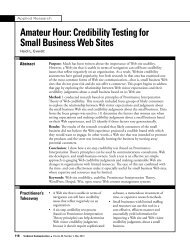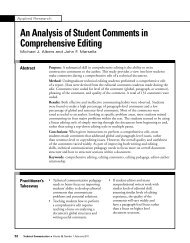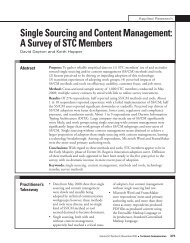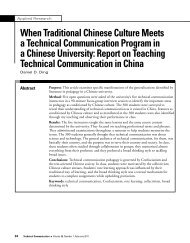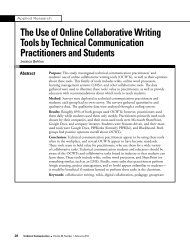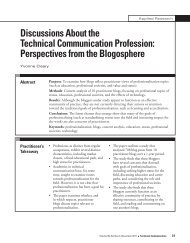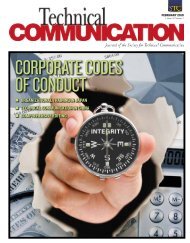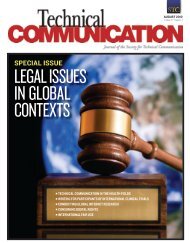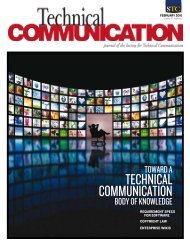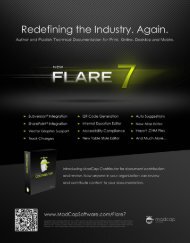Applied ResearchThe First Wave (1953–1961) of the Professionalization Movement“Technical Writer (profess. & kin.) see Writer, TechnicalPublications” (U.S. Employment Service, 1943, p. 320).The entry for “Technical Publications Writer” read asfollows:Figure 11: Pearl I. Young (1895–1968), a technical editor andlater manager of a technical editing group at the Langleyand Cleveland fields of the National Advisory Commissionon Aeronautics, the predecessor of NASA (Verniel &Douglas, 1996). Having majored in physics, chemistry, andmathematics at the University of North Dakota, Young beganher NACA/NASA career as a laboratory assistant (as picturedabove) and was promoted to junior physicist before movinginto editing (c. 1930) (NACA, 1941). She is the eponym of thePearl I. Young Theater at NASA’s Langley Research Center(NASA, n.d.). Public domain photo from NASA.The Dictionary of Occupational Titles, published bythe U.S. Employment Service in four major editions(and many supplements) between 1939 and 1991,sheds light on the emergence of the government job title“Technical Writer” in the post-World War II era. Thefirst edition of the dictionary, published in 1939, didnot include “Technical Writer” at all, but it did include“Editor of a Trade or Technical Publication”:Editor, Trade-or-Technical Publication (print &pub.) 0-06.53. Edits a trade or technical publication:accepts or rejects material; writes editorials andspecial articles, maintaining editorial policy ofpublication; makes field trips in search of newpractices or first hand information on conditions;consults advisers on trade or technical questions;edits material; plans lay-out and checks andapproves final proofs of issue. (U.S. EmploymentService, 1939, p. 316)As a job title, “Technical Writer” made its debut ina 1943 supplement to the first edition of the dictionary:Writer, Technical Publications; ordnance engineer;technical writer (profess. & kin.) 0-06.90. Preparestechnical manuals, bulletins, and other publicationsdealing with subjects, such as improvements inelectrical and mechanical equipment and services,and the assembly, use, maintenance, repair, andtransportation of ordnance materials: consultsworkers engaged in developing new equipmentand in making improvements, and other sources,such as blueprints, trade and engineering journals,and manufacturers’ catalogs, to acquire or verifytechnical knowledge of subject; selects, organizes,edits, and rewrites articles, bulletins, manuals,or other materials dealing with general andparticular phases of subject; directs preparationof illustrative materials, such as photographs,drawings, and sketches. May specialize in aparticular phase of technical writing, such as use,repair, and maintenance of firearms, or tanks, or theapplication, theory, installation, and operation oftelephone and telegraph equipment. (p. 352)Note that the occupation is classified as “profess. & kin.”Thus, as early as 1943, the U.S. government formallyrecognized “Technical Writer” as belonging to a groupof “professional and kindred occupations”—that is,occupations requiring specialized study and training.Sweet (1957) noted that many technicalcommunicators in the 1950s took great comfort fromthe fact that government agencies such as the Bureauof Census and the Federal Security Agency listed thetechnical writer as a professional worker; however, asSweet (1957) also pointed out, these agencies recognizedthe billiard player, jockey, dog trainer, freak, masseur,gambler, fortune teller, animal impersonator, yodeler,and stooge as professional workers (p. 65)The history of the struggle for legal (i.e., judicial)recognition of the profession extends back to at least1957, when a U.S. federal court ruled that a technicalwriter was a professional under the U.S. Department ofLabor’s Wage and Hours Act and therefore exempt fromreceiving time-and-a-half pay for overtime work.300 Technical Communication l Volume 58, Number 4, November 2011
Applied ResearchEdward A. MaloneFrom January 1955 to July 1956, David Rothsteinworked as a technical writer for Cannon & SullivanTechnical Publications in Los Angeles. He createdtechnical handbooks from engineering data presentedon blueprints and was also in charge of deciding whatartwork was needed and ordering it. In adjudicatinghis lawsuit, the court found that “The type of workperformed by a technical writer is predominantlyintellectual and creative, rather than routine,” requiring“judgment or discretion,” and that Rothstein was “abona fide professional employee” (Rothstein, 1957).In other words, the court ruled against Rothstein, whodid not want to be regarded as a professional in theWage and Hours Act sense because it meant less pay forovertime work.Similarly, the profession received legal recognitionfrom the U.S. Immigration and NaturalizationService (INS) in the early 1980s. In 1979, a technicalpublications writer from India was denied “preferencestatus” to immigrate to the United States when an INSDistrict Director decided that he did not belong to aprofessional occupation. The company that wanted tohire the writer filed an appeal, and the case was sent to aRegional Commissioner, who ruled c. 1980 that technicalwriting was a professional occupation because entry intothe occupation typically required a bachelor’s degreefrom a university. STC’s Executive Director had solicitedstatements to that effect from three editors in the field andan academic program director and submitted them to thepetitioner’s attorney, and apparently this testimony swayedthe INS official. Commenting on the INS’s ruling, theeditor of STC’s Technical Communication declared that“Technical Writers [were] Legally Professionals Now”(Smith, 1981, p. 3).ConclusionProfessionalization has been a long-term project that hasincluded achievements as well as setbacks and delays.If nothing else, our history teaches us to be cautiouslyoptimistic about those achievements. Many times inthe past we have felt confident that mature professionalstatus was just around the corner, only to discoverthat it was farther away than we thought. It is easy toexaggerate or overestimate an accomplishment in thesatisfaction of the moment, particularly when we lack astrong historical consciousness as a profession. Althoughit would be wrong to describe professionalization as aSisyphean task, it has been a frustrating one so far. Ourappraisal of our gains must be tempered by a certainamount of realism and an awareness of the history of theprofessionalism movement in technical communication.The recent achievement of a measure of legalrecognition by the U.S. Bureau of Labor Statistics(BLS) is a case in point. We have been trumpetingthe government’s recognition of technical writing as aprofession—or at least a professional activity—sincethe 1950s, but what has that recognition really donefor the technical communicator’s professional status?Although persuading the BLS to segregate technicalwriting from other forms of writing in its OccupationalOutlook Handbook was an accomplishment, it wasnot the accomplishment that STC had set its sightson achieving. STC was trying to persuade the BLSto replace the term “technical writer” and its narrowimplications with the term “technical communicator”and its much broader implications (Martin &O’Sullivan, 2010). The fact that the BLS did notrecognize “technical communication” as the name of ourprofession more than 40 years after the profession itselfofficially embraced that term should give us pause.Although the unification of technicalcommunication organizations in the late 1950sand early 1960s has given way to a multiplicity oftechnical communication organizations in the 21stcentury, and at least one technical communicationprofessor believes that we are “diluting our efforts”with “too many organizations” (as cited in Carliner,2003, p. 95), there may still be cause for optimism.We should view the creation of organizations such asATTW and CPTSC and international organizationsof technical communicators in places like Australia,Japan, Germany, France, and Switzerland as evidenceof the profession’s continued growth and relevance overthe years. In recent decades, there have been attemptsto achieve greater cooperation, if not unification,among these organizations. In the 1990s and early2000s, for example, representatives of the majortechnical communication organizations met annuallyfor an informal Summit of Technical CommunicationOrganizations (Carliner, 2003). TCeurope andIntecom are international umbrella organizations thatfoster cooperation among national organizations.Volume 58, Number 4, November 2011 l Technical Communication 301



